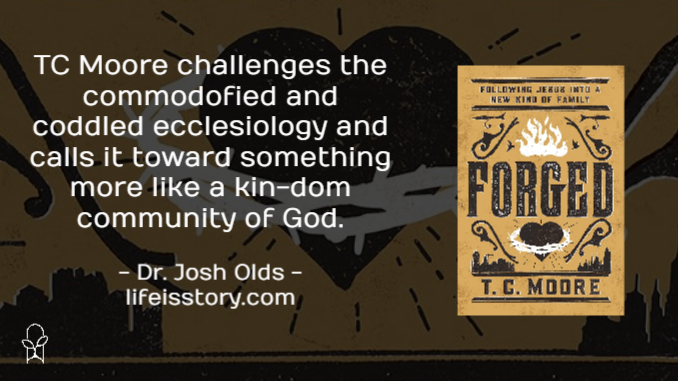
Published by Broadleaf Books on February 13, 2024
Genres: Non-Fiction, Christian Life, Leadership
Buy on Amazon
Goodreads

Following the way of Jesus should lead us into authentic and life-giving relationships.
The Jesus Way calls us into community with others to form a new kind of family--a forged family. In an era when our relationships with our families of origin are more complicated than ever, pastor T. C. Moore shows us how following the way of Jesus can lead us to forged families that are authentic and life-giving.
Our forged families are the ones who love us for who we are and show up for us when we're in desperate need. Our forged families are the ones with whom we've worked through conflict. Our forged families make us who we are, strengthen our faith, and sustain us through life's many challenges.
Forged weaves together stories from the author's over twenty years of experience with urban, multiethnic ministry all over the US, principles from Scripture, and his own experience as an ex-gang member turned church planter and pastor to propose a way of approaching faith in community that rejects hierarchical, bureaucratic structures in favor of formative, inclusive friendships that last.
Several years ago, I interviewed Christian author Jerry Jenkins about a novel he wrote and he told me the story about a gang member he interviewed for the book who gave his life to Christ but then returned to the gang. The guy told him “I thought the church would be like the gang. I thought it would be family.” The guy was right. It should have been. But increasingly, it seems,
“the family of God” never quite comes together. In Forged, T.C. Moore leads readers into how we can create and sustain that kinship connection.
Perhaps not surprisingly, Moore’s background is similar to the gang member that Jenkins interviewed. He grew up in gang life, was liberated from it as a teenager, and his entire ministerial focus is on developing church family and community. Forged begins by dismantling the myth of the nuclear family. This in itself could be a whole book. Moore makes the case that this version of American individualism cut people off from their communities and heightened inequality. He makes the point that the communal nature of the early church stood in contrast to the Roman Empire’s view of family and advocates for a Christian view of family as something much more expansive than “nuclear.”
Forged then weaves between Moore’s personal and ministerial experiences while navigating through the examples set by Jesus and the early church. He shows how this focus on the church as “forged family” creates a sense of loyalty and closeness that alleviates loneliness and helps those in community find a sense of belonging. However, Moore also doesn’t shy away from the complications of being called family. I’ve been in situations where “we’re a family here” was meant to excuse overworking/underpaying or other such toxic situations. Moore mentions this specifically—and though I think it could have been given more prominence on how to recognize and avoid this trap, I deeply appreciate it even getting a mention.
Another thing I appreciated is that Moore is clear that having a family mentality will lead to conflict—closeness of relationship inevitably does—but it also transforms how we deal with conflict. Because we are family, we compromise, we work together, we solve the problem, rather than walking away.
Forged is a book about a new way of church. But it’s actually the old way of church. Churches today have become so institutionalized and commercialized that they’ve lost their distinctive features of being part of God’s kin-dom community. Moore calls readers to a deeper level of connection that can be truly transformative—not just for our own lives but for our communities as well. Like Amos railing against religious empire, TC Moore challenges the commodified and coddled ecclesiology of the American church to something more vulnerable, more authentic, more genuine, more demanding, and more in line with Kingdom of God.
